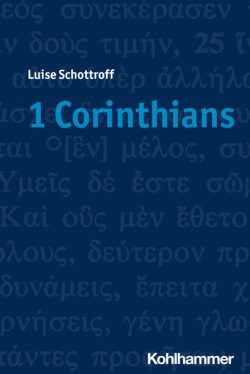Читать книгу 1 Corinthians - Luise Schottroff - Страница 13
На сайте Литреса книга снята с продажи.
2. Paul and the Messiah
ОглавлениеThe Messiah has been raised by God, as the world power Rome had crucified him. As Paul was called by God for the gospel to the nations, he began his way as God’s representative, as an apostle (see on 1:1). He understands his commission to be part of a worldwide event (see 16:5–9), as part of the work in a network to which more and more people belong. His concern is not to establish a church or a religion, but to help spread liberation from enslavement to death and to sin in the world of his time. For him, this spread occurs where people come together and investigate with one another what their way to God’s righteous can look like. The concept »mission« can be used only when it is kept separate from the claim that it helps an institution or a teaching to come to power.
By the resurrection of the crucified Jesus God has put an end to death and violence. This message is the foundation of the gospel Paul brings to the Mediterranean world. The Roman Empire enforced its rule through open and subtle violence. This violence includes crucifixions as a means of political intimidation but also »games,« that is, events for the masses in many cities, in which people were tortured and killed (see 4:9). The crowds were supposed to have an apparent role in the great decisions over death and life and to cheer about the violence in the arenas. Whoever didn’t participate in this approval of the violence was in danger of being persecuted by Rome. This anxiety over persecution, therefore, had even brought people who already belonged to the communities of the God of Israel (ekklēsiai theou) to deny the crucifixion of their Liberator, that is, to suppress the word of the cross (see 1:17, 18), and also the resurrection of the Messiah as well. Already before the appearance of the Jew Jesus, who was seen by many people as God’s Liberator/Messiah, Rome had persecuted messianic movements (see the basic information before 15:1). Paul battles to see that God’s congregations remain unambiguous about their adherence to a crucified one who was made the Messiah by God. For he understands the assembly or congregation of God as the body of the Messiah in this world. The concept of a collective body, with which God is active in the world, is not to be understood metaphorically (see on 12:12, 27). The congregation, with all its members, embodies the Messiah and acts messianically, with one another and toward those on the outside. It openly identifies violence by name and builds a community in which justice becomes a reality. Justice liberates sexuality from its use as a form of coercion (see.6:12–20; 7:1–40); it gives the poor equal rights and puts an end to privileges the rich enjoy at other people’s expense (1:26–31; 11:17–34). Women are accorded the same level of dignity as men (see 11:2–16). The ethnic diversity, the many native languages spoken by members of the congregation, should not be suppressed for the sake of the lingua franca. There is contention over a form of this speech that can be heard openly in the congregation alongside of prophecy (spoken in the common language; basic information about this is available at 14:1).
The body of the Messiah, Jesus’ body, and people’s individual bodies are where God is present (11:23; 12:12, 27; 6:19). In the Lord’s Supper, these diverse dimensions of the concept »body of Christ« (sōma christou) are inseparably connected. The Lord’s Supper is the place where the bodily presence of God and of the Messiah is constantly being actualized anew.
